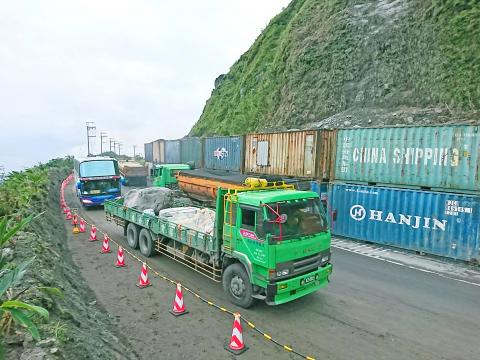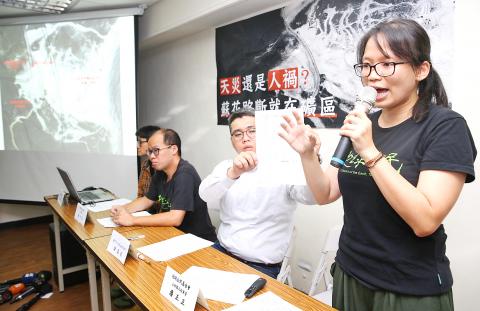A landslide on Suhua Highway in Yilan County earlier this week might have been triggered by mining activity in the old mines near the highway, environmentalists told at a news conference in Taipei yesterday, urging the government to investigate the incident.
The highway’s Jiugongli (九宮里) section near the 112.6km mark was closed from Sunday to Tuesday after a landslide fell down from 185m, blocking the road.
There were no casualties, but many Taipei residents who had traveled to Hualien for the Dragon Boat Festival holiday could not return home before work resumed on Wednesday.

Photo copied by Chiang Chih-hsiung, Taipei Times
President Tsai Ing-wen (蔡英文) on Thursday in a Facebook post said that the highway was closed because of a natural disaster.
She lauded the efforts of the response personnel, who arranged alternative transportation for the people affected.
Citizen of the Earth Taiwan consultant Tsai Chung-yueh (蔡中岳) rejected claims that the landslide happened naturally, saying there was a combination of causes behind it.

Photo: CNA
The government is used to ignoring slope exploitation as a possible cause of landslides, he said.
There are four old marble mines near the Jiugongli section — Tai Shih (台石) mine, Wu Yan (烏岩) No. 2 mine, Pei Hua (北華) mine and Hainan Corp’s (海南實業) Wu Yan No. 1 mine — the organization said.
“Looking at aerial photographs of the landslide you can see the slope is barely covered with grass,” he said, adding that the exploited lands were not duly restored.
“The authorities should probe the causes of the landslide. If it had nothing to do with the mines, they should still provide a better explanation for the cause,” he said.
Concerned with what the group said was the government’s loose management of mines, Citizen of the Earth Taiwan researcher Pan Cheng-cheng (潘正正) demanded that the outdated Mining Act (礦業法) be revised.
“The legislature’s Economics Committee promised to re-examine the act at the onset of this session. However, the Democratic Progressive Party caucus has been pushing their priority bills and have paid little attention to the act,” Pan said.
Article 27 of the act stipulates that land within 150m of national and provincial highways should not be opened up to mining without the permission of the authorities or property owners, she said.
The Ministry of Economic Affairs’ Department of Mines had asked miners to sign documents promising not to exploit lands within 150m of highways, but had failed to enforce the regulations, Pan said.
The organization demanded that the authorities investigate the landslide’s cause in depth and disclose the location of all mines along the Suhua Highway.
A strategic environmental assessment of the mines should be conducted as well, Pan said.
The department issued a statement saying that an examination of the area where the landslide occurred revealed that heavy rain was the cause.
The mines, one active and three closed, are at some distance from where the landslide occurred, the department said.
Directorate-General of Highways Section Chief Nanao Chen Wen-chang (陳文昌) said further investigation is needed.
“We have invited experts and academics to look into the issue and we will publish a report later,” Chen said yesterday by telephone.
The Jiugongli section of the highway has been cleared of debris, but clean-up efforts in the surrounding area will continue for several more days, he said, adding that heavy rains might cause delays.

Japanese footwear brand Onitsuka Tiger today issued a public apology and said it has suspended an employee amid allegations that the staff member discriminated against a Vietnamese customer at its Taipei 101 store. Posting on the social media platform Threads yesterday, a user said that an employee at the store said that “those shoes are very expensive” when her friend, who is a migrant worker from Vietnam, asked for assistance. The employee then ignored her until she asked again, to which she replied: "We don't have a size 37." The post had amassed nearly 26,000 likes and 916 comments as of this

US President Donald Trump said "it’s up to" Chinese President Xi Jinping (習近平) what China does on Taiwan, but that he would be "very unhappy" with a change in the "status quo," the New York Times said in an interview published yesterday. Xi "considers it to be a part of China, and that’s up to him what he’s going to be doing," Trump told the newspaper on Wednesday. "But I’ve expressed to him that I would be very unhappy if he did that, and I don’t think he’ll do that," he added. "I hope he doesn’t do that." Trump made the comments in

Tourism in Kenting fell to a historic low for the second consecutive year last year, impacting hotels and other local businesses that rely on a steady stream of domestic tourists, the latest data showed. A total of 2.139 million tourists visited Kenting last year, down slightly from 2.14 million in 2024, the data showed. The number of tourists who visited the national park on the Hengchun Peninsula peaked in 2015 at 8.37 million people. That number has been below 2.2 million for two years, although there was a spike in October last year due to multiple long weekends. The occupancy rate for hotels

A cold surge advisory was today issued for 18 cities and counties across Taiwan, with temperatures of below 10°C forecast during the day and into tonight, the Central Weather Administration (CWA) said. New Taipei City, Taipei, Taoyuan and Hsinchu, Miaoli and Yilan counties are expected to experience sustained temperatures of 10°C or lower, the CWA said. Temperatures are likely to temporarily drop below 10°C in most other areas, except Taitung, Pingtung, Penghu and Lienchiang (Matsu) counties, CWA data showed. The cold weather is being caused by a strong continental cold air mass, combined with radiative cooling, a process in which heat escapes from